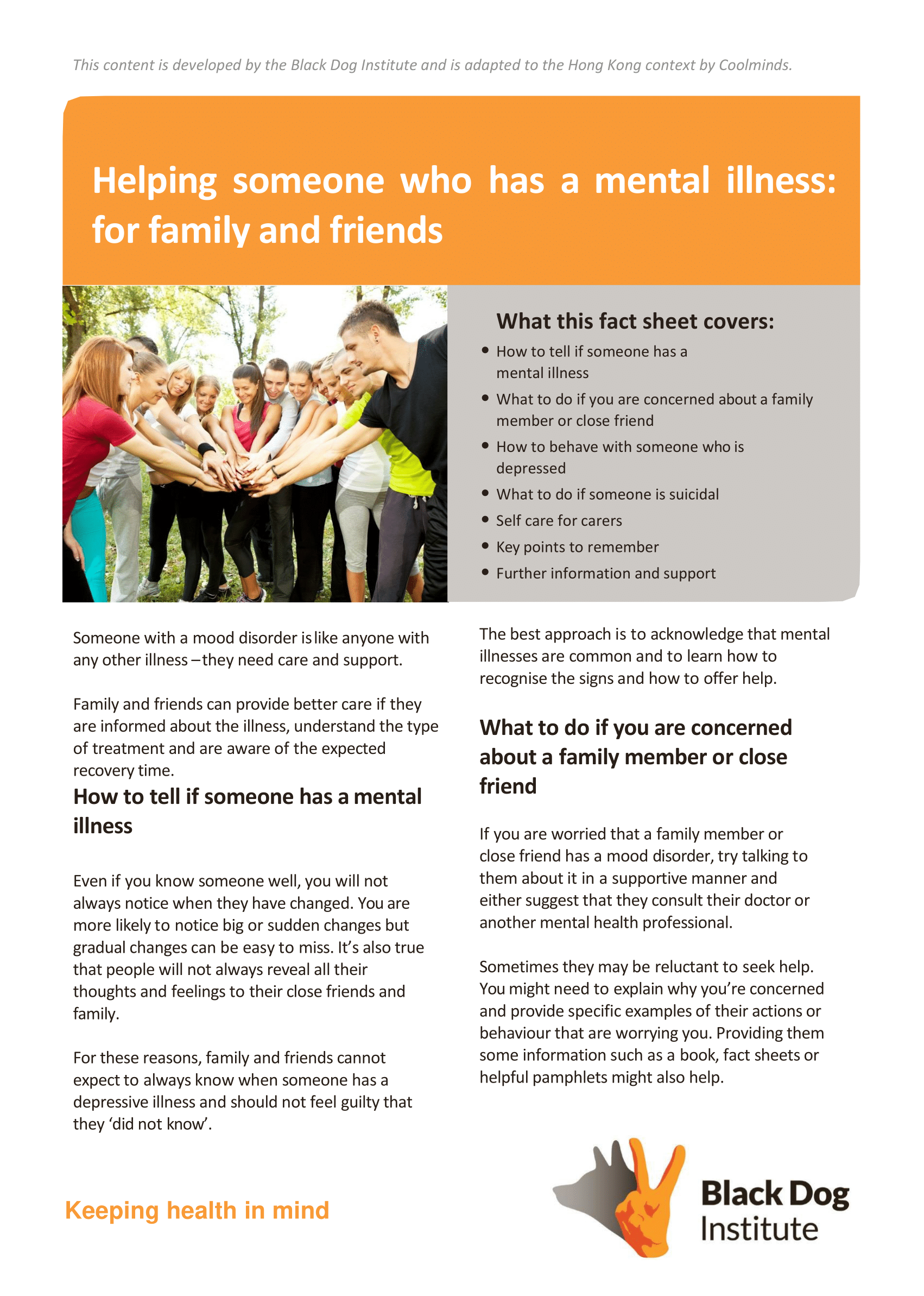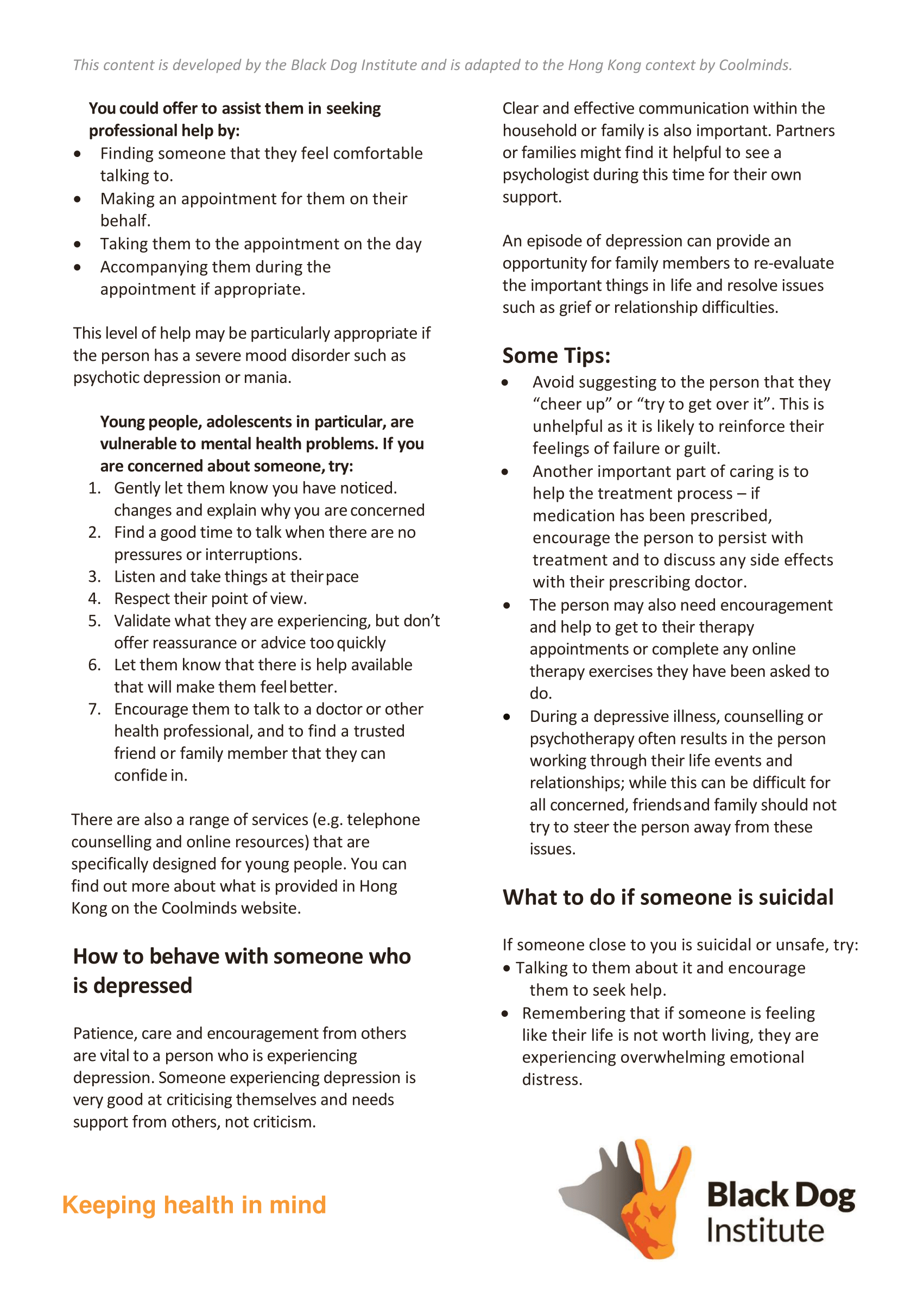This resource booklet has been localised for the Hong Kong context and translated to Traditional Chinese by Coolminds, a mental health initiative run by Mind HK and KELY Support Group. For more information on Coolminds, please visit www.coolmindshk.com
Thank you to the Black Dog Institute for donating their resources and for allowing us to adapt this. For the original version of this resource, please refer to the Black Dog Institute’s website: www.blackdoginstitute.org.au
What this fact sheet covers:
- How to tell if someone has a mental illness
- What to do if you are concerned about a family member or close friend
- How to behave with someone who is depressed
- What to do if someone is suicidal
- Self care for carers
- Key points to remember
- Further information and support
Someone with a mood disorder is like anyone with any other illness – they need care and support.
Family and friends can provide better care if they are informed about the illness, understand the type of treatment and are aware of the expected recovery time.
How to tell if someone has a mental illness
Even if you know someone well, you will not always notice when they have changed. You are more likely to notice big or sudden changes but gradual changes can be easy to miss. It’s also true that people will not always reveal all their thoughts and feelings to their close friends and family.
For these reasons, family and friends cannot expect to always know when someone has a depressive illness and should not feel guilty that they ‘did not know’.
The best approach is to acknowledge that mental illnesses are common and to learn how to recognise the signs and how to offer help.
What to do if you are concerned about a family member or close friend
If you are worried that a family member or close friend has a mood disorder, try talking to them about it in a supportive manner and either suggest that they consult their doctor or another mental health professional.
Sometimes they may be reluctant to seek help. You might need to explain why you’re concerned and provide specific examples of their actions or behaviour that are worrying you. Providing them some information such as a book, fact sheets or helpful pamphlets might also help.
You could offer to assist them in seeking professional help by:
- Finding someone that they feel comfortable talking to.
- Making an appointment for them on their behalf.
- Taking them to the appointment on the day
- Accompanying them during the appointment if appropriate.
This level of help may be particularly appropriate if the person has a severe mood disorder such as psychotic depression or mania.
Young people, adolescents in particular, are vulnerable to mental health problems. If you are concerned about someone, try:
- Gently let them know you have noticed. changes and explain why you are concerned
- Find a good time to talk when there are no pressures or interruptions.
- Listen and take things at their pace
- Respect their point of view.
- Validate what they are experiencing, but don’t offer reassurance or advice too quickly
- Let them know that there is help available that will make them feel better.
- Encourage them to talk to a doctor or other health professional, and to find a trusted friend or family member that they can confide in.
There are also a range of services (e.g. telephone counselling and online resources) that are specifically designed for young people. You can find out more about what is provided in Hong Kong on the Coolminds website.
How to behave with someone who is depressed
Patience, care and encouragement from others are vital to a person who is experiencing depression. Someone experiencing depression is very good at criticising themselves and needs support from others, not criticism.
Clear and effective communication within the household or family is also important. Partners or families might find it helpful to see a psychologist during this time for their own support.
An episode of depression can provide an opportunity for family members to re-evaluate the important things in life and resolve issues such as grief or relationship difficulties.
Some Tips:
- Avoid suggesting to the person that they “cheer up” or “try to get over it”. This is unhelpful as it is likely to reinforce their feelings of failure or guilt.
- Another important part of caring is to help the treatment process – if medication has been prescribed, encourage the person to persist with treatment and to discuss any side effects with their prescribing doctor.
- The person may also need encouragement and help to get to their therapy appointments or complete any online therapy exercises they have been asked to do.
- During a depressive illness, counselling or psychotherapy often results in the person working through their life events and relationships; while this can be difficult for all concerned, friends and family should not try to steer the person away from these issues.
What to do if someone is suicidal
If someone close to you is suicidal or unsafe, try:
- Talking to them about it and encourage them to seek help.
- Remembering that if someone is feeling like their life is not worth living, they are experiencing overwhelming emotional distress.
- Helping the person to develop a safety plan involving trusted close friends or family members that can keep the person safe in times of emergency.
- Removing risks (e.g. take away dangerous weapons or items if that person is angry or out of control and threatening to disappear).
Self care for carers
(A carer is someone who provides support to a friend, family member, or neighbor in need of help because of their age, disability, or physical or mental health.)
- Carers are also likely to experience stress. Depression and hopelessness have a way of affecting the people around them.
- Therapy can release difficult thoughts and emotions in carers too. So, part of caring is for carers to look after themselves to prevent becoming physically run down and to deal with their internal thoughts and emotions.
- Treatment has a positive time as well; when the person starts to re-engage with the good things in life and carers can have their needs met as well.
Key points to remember
- If you are worried that someone is depressed or has bipolar disorder, try talking to them about it in a supportive manner and suggest that they see a mental health professional.
- If they don’t want to seek help, explain the reasons for concern and perhaps provide them with some relevant information.
- Young people are particularly vulnerable to depression.
- Patience, care and encouragement from others are all vital to the person who is depressed.
- If a loved one talks of suicide, encourage them to seek help immediately from a mental health professional.
- Depression can take a toll on carers and close family members – it is important for these people to take care of themselves as well.
Contact Us
Coolminds
Email: hello@coolmindshk.com
Black Dog Institute
Email: blackdog@blackdog.org.au
Where to get more help and support
Bilingual Web Resources
Mind Hong Kong – “Am I A Carer?”
Mind Hong Kong – “What Can Friends and Family Do To Help?”
Student Health Service – “Understanding Depression”
Student Health Service – “Emotional Health”
English-Only Web Resources
Reach Out: a web-based support for adolescents
Headspace online: help for young people
Bilingual Telephone Hotlines
Samaritans Hong Kong 24-hour hotline: 28960000
Samaritan Befrienders Hong Kong 24-hour hotline: 23892222
Suicide Prevention Services 24-hour hotline: 23820000
Suicide Prevention Services “Youth Link” hotline (available 2pm-2am): 2382 0777
Hospital Authority Mental Health 24-hour Hotline: 2466 7350
Social Welfare Department Hotline: 2343 2255
Chinese-Only Telephone Hotlines
Youth Outreach 24-hour hotline service: 90881023
The Hong Kong Federation of Youth Groups “Youthline” hotline (available Mon-Sat, 2pm-2am): 27778899






